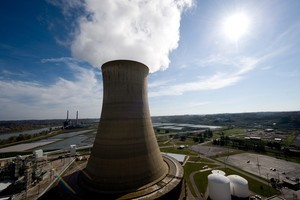Mississippi Court Ends Global-Warming Suit

A federal judge in Mississippi has ended a long-running suit that attempted to hold a selection of U.S. utilities and coal and oil companies responsible for flooding damage caused by Hurricane Katrina.
U.S. District Judge Louis Guirola Jr., in a decision released yesterday, dismissed Comer vs. Murphy Oil with prejudice, meaning it can’t be refiled or reconstituted. The decision should serve to preclude, other similar lawsuits accusing companies of emitting global-warming gases that cause damaging weather patterns.
Guirola dismissed the case for legal reasons — he’d already dismissed it once before, and he said the plaintiffs were barred by various legal doctrines from reviving it — but “out of an abundance of caution” he reiterated why the case shouldn’t be allowed to proceed.
Those reasons are becoming familiar in global-warming cases: Guirola ruled the case invalid because the underlying issue of global warming is a political question, best left to the legislative branch and regulators to decide. And because existing tort law requires plaintiffs to prove a more solid connection between their injuries and the actions of those they are suing than a scientifically plausible argument that one contributed to the other.
Plaintiff lawyers have tried various ways to fit global warming into conventional tort law, where they can construct a case showing industry executives were aware of the threat of CO2 emissions and did nothing about it. That would allow them to make the argument that the industry exposed others to “unreasonable” risks. The evidence would be memos and other material showing they were aware of scientific links between CO2 and global warming, regardless of whether they believed them, much as the states pursued lawsuits against the tobacco industry by uncovering evidence executives were aware of research showing links to cancer and addiction.
Guirina wasn’t buying it, saying global warming was too complex an issue to ask a court to decide: “The plaintiffs are asking the Court, or more specifically a jury, to determine without the benefit of legislative or administrative regulation, whether the defendants’ emissions are `reasonable,’” he said.
The case followed an odd route after dismissal up to the Fifth Circuit, where a three-judge panel reinstated some of the claims, then an en banc panel agreed to rehear the appeal, only to dismiss the case when it couldn’t form a quorum of nine judges. The plaintiffs declined to appeal to the U.S. Supreme Court.
The decision helps close the door on global-warming litigation by private plaintiffs. The U.S. Supreme Court offered some hope to plaintiffs in 2007 when it held that Massachusetts could sue the E.P.A. for failing to enact rules to control CO2 emissions that threatened the state’s coastline. That seemed to affirm the basic idea that CO2 was a pollutant covered by the Clean Air Act. But the Supreme Court eased that door shut last year with Conn. v. AEP, where it said Connecticut must wait until or unless the EPA issues regulations before suing individual companies over emissions. The Ninth Circuit also dismissed a lawsuit by Inuit villagers against ExxonMobil and other companies, citing the political question doctrine.
The judge refused a request for sanctions against attorney F. Gerald Maples for refiling the case after it had been dismissed, saying he acted in “good faith” under a Mississippi law that might have, but didn’t, offer an extension of the statute of limitations.
2012 Forbes.com LLC™ All Rights Reserved http://www.forbes.com